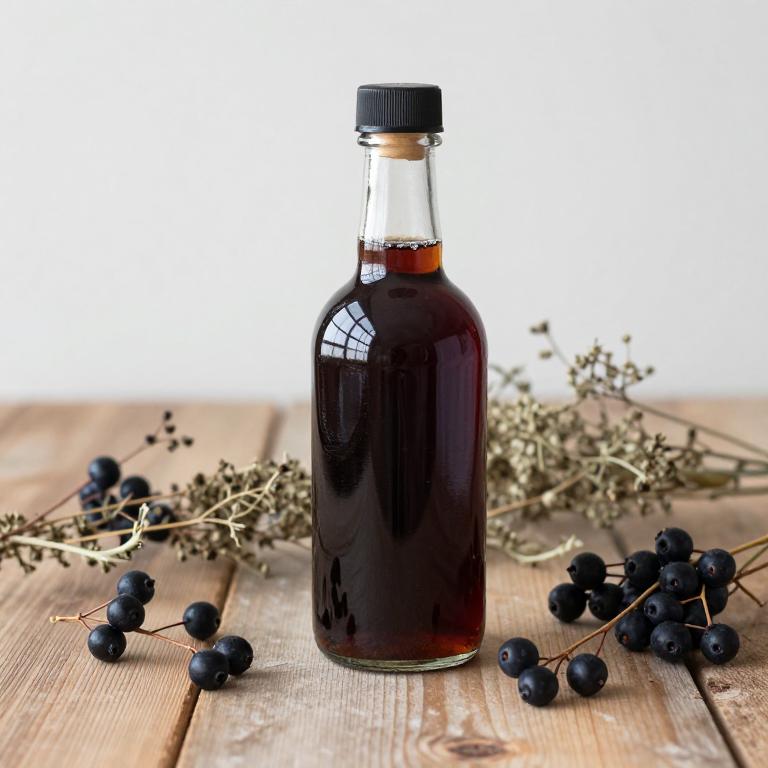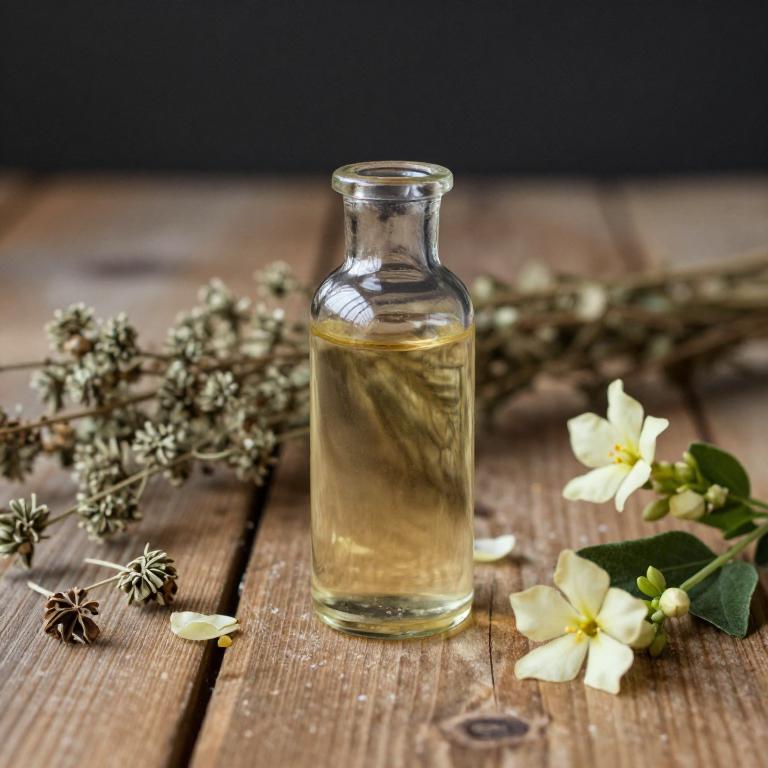10 Best Herbal Syrups For Infection

Herbal syrups are natural remedies that have been traditionally used to support the body's fight against infections by boosting the immune system and reducing inflammation.
These syrups often contain a blend of herbs such as echinacea, garlic, ginger, and goldenseal, which are known for their antimicrobial and antiviral properties. They are typically easy to consume, making them a popular choice for children and adults alike. While they may not replace conventional antibiotics, herbal syrups can complement medical treatments and provide symptomatic relief.
However, it is important to consult a healthcare professional before using herbal syrups, especially for severe or persistent infections.
Table of Contents
- 1. Echinacea (Echinacea purpurea)
- 2. Thyme (Thymus vulgaris)
- 3. Ginger (Zingiber officinale)
- 4. Ceylon cinnamon (Cinnamomum verum)
- 5. St. john's wort (Hypericum perforatum)
- 6. Black elderberry (Sambucus nigra)
- 7. Salvia (Salvia officinalis)
- 8. Peppermint (Mentha piperita)
- 9. Rosemary (Rosmarinus officinalis)
- 10. Geranium (Pelargonium graveolens)
1. Echinacea (Echinacea purpurea)

Echinacea purpurea, commonly known as purple coneflower, is a popular herbal remedy often used to support the immune system and reduce the duration of colds and upper respiratory infections.
Herbal syrups made from Echinacea purpurea are typically prepared by extracting the dried roots, leaves, and flowers with alcohol or water, resulting in a concentrated, aromatic liquid. These syrups are believed to have anti-inflammatory and antioxidant properties that may help combat viral and bacterial infections. Due to their natural ingredients, they are often preferred by individuals seeking alternative or complementary treatments.
However, it is important to consult a healthcare provider before use, especially for children, pregnant women, or those with chronic health conditions.
2. Thyme (Thymus vulgaris)

Thymus vulgaris, commonly known as thyme, is a popular herb used in traditional medicine for its antimicrobial properties.
Thyme herbal syrups are often prepared using essential oils extracted from the leaves and flowers of the plant, which contain compounds like thymol and carvacrol. These compounds have been shown to exhibit strong antibacterial, antifungal, and antiviral activities, making thyme syrup a natural remedy for various infections. The syrup is typically used to alleviate symptoms of respiratory infections, such as coughs and sore throats, due to its expectorant and decongestant effects.
However, it is important to consult with a healthcare professional before using thyme syrup, especially for children or individuals with known allergies or medical conditions.
3. Ginger (Zingiber officinale)

Zingiber officinale, commonly known as ginger, has been traditionally used for its anti-inflammatory and antimicrobial properties, making it a valuable component in herbal syrups for treating infections.
These syrups often combine ginger with other medicinal herbs like echinacea, licorice root, and garlic to enhance their therapeutic effects. The active compounds in ginger, such as gingerol and shogaol, have been shown to inhibit the growth of certain bacteria and viruses, supporting the body's natural defenses. Herbal syrups made from zingiber officinale are particularly popular for alleviating symptoms of respiratory infections, such as coughs and sore throats.
However, while they may offer supportive benefits, they should not replace conventional medical treatments for serious infections without professional guidance.
4. Ceylon cinnamon (Cinnamomum verum)

Cinnamomum verum, commonly known as true cinnamon, has been traditionally used in herbal syrups for its antimicrobial and anti-inflammatory properties.
These syrups are often prepared by infusing cinnamon bark in a base of honey or sugar, creating a soothing and aromatic remedy. The essential oils in cinnamon, particularly cinnamaldehyde, exhibit broad-spectrum antimicrobial activity, making it effective against certain bacteria and fungi. While cinnamon syrups may offer supportive relief for mild respiratory infections or sore throats, they should not replace conventional medical treatments for serious infections.
Due to its warming and stimulating effects, cinnamon syrup is generally recommended for external use or in moderation when consumed internally.
5. St. john's wort (Hypericum perforatum)

Hypericum perforatum, commonly known as St. John's Wort, is traditionally used in herbal medicine for its potential antimicrobial properties.
While it is well-known for its use in treating mild depression, recent studies suggest that its herbal syrups may have antimicrobial effects against certain bacterial and fungal infections. The active compounds in Hypericum perforatum, such as hypericin and hyperforin, are believed to contribute to its antimicrobial activity by disrupting microbial cell membranes. However, it is important to note that while some preliminary research supports its use, more clinical trials are needed to confirm its efficacy and safety for treating infections.
As with any herbal remedy, it should be used under the guidance of a healthcare professional to avoid interactions with other medications.
6. Black elderberry (Sambucus nigra)

Sambucus nigra, commonly known as European elderberry, has been traditionally used in herbal medicine for its potential antiviral and immune-boosting properties.
Herbal syrups made from elderberries are often used to support the body during colds, flu, and other respiratory infections due to their high concentration of antioxidants and flavonoids. These syrups may help reduce the duration and severity of symptoms by enhancing immune function and combating viral replication. However, it is important to note that while elderberry syrups are generally considered safe when prepared properly, they should not be consumed raw or uncooked due to the presence of toxic compounds in raw berries.
As with any herbal remedy, it is advisable to consult with a healthcare professional before use, especially for individuals with chronic conditions or those taking other medications.
7. Salvia (Salvia officinalis)

Salvia officinalis, commonly known as sage, has been traditionally used in herbal medicine for its antimicrobial properties, and its herbal syrup formulations are gaining attention for their potential role in treating infections.
The syrup contains essential oils, flavonoids, and phenolic compounds that exhibit antibacterial, antifungal, and antiviral activities, making it a promising natural remedy. Studies suggest that sage syrup may help alleviate symptoms of respiratory infections, such as sore throat and cough, due to its soothing and decongestant effects. It is often used as a supportive therapy alongside conventional treatments, though it should not replace medical advice for severe or persistent infections.
As with any herbal remedy, it is important to consult a healthcare professional before use, especially for individuals with chronic conditions or those taking other medications.
8. Peppermint (Mentha piperita)

Mentha piperita, commonly known as peppermint, is often used in herbal syrups to help alleviate symptoms of infections, particularly those affecting the respiratory system.
The active compounds in peppermint, such as menthol and menthone, have mild antimicrobial properties that may support the body’s natural defenses against bacterial and viral infections. Peppermint syrup can help reduce congestion, soothe sore throats, and ease coughing, making it a popular remedy for colds and flu. However, it is important to note that while peppermint may provide symptomatic relief, it should not replace conventional medical treatments for serious infections.
As with any herbal remedy, it is advisable to consult a healthcare professional before use, especially for children, pregnant women, or individuals with existing health conditions.
9. Rosemary (Rosmarinus officinalis)

Rosmarinus officinalis, commonly known as rosemary, has been traditionally used for its antimicrobial properties, making it a valuable component in herbal syrups for treating infections.
The essential oils extracted from rosemary, particularly containing compounds like camphor and cineole, exhibit broad-spectrum antimicrobial activity against various bacteria and fungi. These syrups are often formulated to support respiratory and urinary tract infections due to their expectorant and anti-inflammatory effects. When used as part of a holistic treatment approach, rosemary-based syrups can complement conventional therapies and enhance immune function.
However, it is important to consult a healthcare professional before using these syrups, especially for prolonged or severe infections.
10. Geranium (Pelargonium graveolens)

Pelargonium graveolens, commonly known as geranium, is a plant used in herbal medicine for its potential antimicrobial properties.
Herbal syrups made from Pelargonium graveolens are traditionally used to support the body's natural defenses against infections, particularly respiratory tract infections. These syrups may contain compounds such as essential oils and flavonoids, which have been studied for their ability to inhibit the growth of certain bacteria and viruses. While some preliminary research suggests these syrups may have therapeutic benefits, more clinical studies are needed to confirm their efficacy and safety.
As with any herbal remedy, it is advisable to consult a healthcare professional before use, especially for individuals with existing health conditions or those taking other medications.